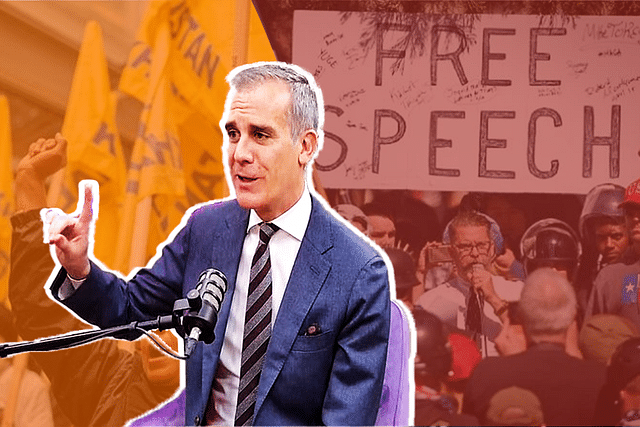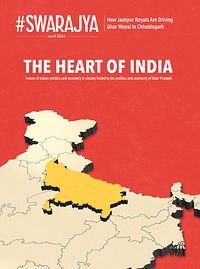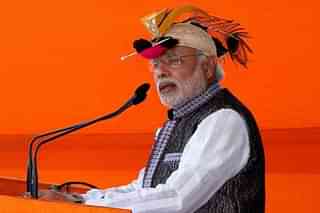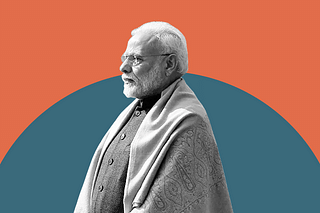Commentary
Dear Ambassador Garcetti, Find A Better Excuse For US' Unwillingness To Punish Pannun
Abhishek Kumar
Apr 01, 2024, 06:08 PM | Updated Apr 02, 2024, 12:26 PM IST
Save & read from anywhere!
Bookmark stories for easy access on any device or the Swarajya app.

In a recent podcast with journalist Smita Prakash, Eric Garcetti, US ambassador to India defended the Biden administration’s stand on Gurpatwant Singh Pannun.
Garcetti said that in America, one can't be punished for speech, instead actions are punished.
“In order to get criminal conviction in the United States of America, you have to actually be taking action, not just making speech,” said Garcetti.
The Ambassador's position has come off to many as absurd. Essentially it suggests that the American state does not take preventive measures to stop any violence.
The absurdity of the argument aside, Garcetti's utterance proves that the US is now openly shielding a terrorist on its soil, who, it increasingly seems, is an asset of its deep state.
But even going by the test that Garcetti sets for the US to take action, it should be easy for Joe Biden's State Department to build a case against Pannun. But let's first look briefly at what US laws and courts say about free speech.
The First Amendment protects free speech in the USA. From press freedom to obscenity, it encompasses every principle. One of the biggest restrictions on it came in Schenck v. United States (1919) case. The Supreme Court upheld his conviction stating that Schenck’s words caused “clear and present danger.” It became a precedent.
In 1969, it was largely overturned in the Brandenburg case. Though the Court let Ku Klux Klan leader Clarence Branderbug go scot-free, it overturned the “clear and present danger” test. It says that the Court can’t punish a person whose speech doesn't lead to imminent lawlessness. The Brandenburg test is acknowledged as the last major pronunciation on free speech by US Supreme Court.
This 'test' has been used by the Indian Supreme Court as well.
Amidst perennially ongoing debates on free speech, authorities and law have been at odds. In June 2023, the US Supreme Court even set a precedent under which Pannun and other Khalistanis could be apprehended.
In June 2023, a US court ruled that it is not free speech when one shows reckless disregard for the danger their speech can cause. Here, the operating phrase is reckless disregard.
Now compare them with what Pannun and his Khalistan ilks did
One, Pannun has threatened to kill Indian Prime Minister Narendra Modi on multiple occasions. Two, in November 2023, Pannun threatened to bomb Air India. Three, in January this year, he threatened to kill Bhagwant Mann, the Chief Minister of Punjab. Four, in January 2024, Pannun threatened to blow India’s National Stock Exchange.
If this wasn't enough, the Khalistanis had attacked India’s consulate in San Francisco on multiple occasions between March and July 2023. Motivation for this had come from the hateful speeches Pannun had given.
Clearly, Pannun has shown reckless disregard to the danger of his speech.
Moreover, this would fit the 'test' laid down by the US court in the Brandenburg case.
But for some reasons, lawyers in the Biden administration have not been able to connect the dots. Or, perhaps, we're being too charitable in our interpretations - perhaps the Biden administration wants to shield Pannun at the behest of the deep state, something that reports say the Indian government believes to be the truth.
Even assuming Garcetti’s argument that it would be tough to prove in Court, what stops the government take to authorities in the United States has been arresting people for jokes posted on social media. The governments in the so-called ‘leader of the free world’ have lowered the bar on punishment for speech when it wanted.
The fundamental principle why free speech exists is to ensure that disputes could be solved with dialogues, rather than going the old tribal route of violence.
Instead, the reality is different in the Pannun case. The terrorist is inciting violence through his speech. So, the speech which should be used to curb violence is being used to promote it. That is a reversal of logic, morality and established principles.
If the US is willing, it is not really difficult to establish a link between Pannun's hateful speeches and the attacks on multiple Hindu temples, common Indians, embassies and diplomats all across the Western Hemisphere. But, it's about the willingness.
The US government is clearly attempting to hunt with the hound and run with the hare. The double standard is really baffling.
At best, Garcetti must find a better excuse for the US' unwillingness to act against Pannun. Perhaps he could tell us why the US has refused to punish those who were responsible for the attack on the Indian consulate in San Francisco.
Save & read from anywhere!
Bookmark stories for easy access on any device or the Swarajya app.
Abhishek is Staff Writer at Swarajya.
Introducing ElectionsHQ + 50 Ground Reports Project
The 2024 elections might seem easy to guess, but there are some important questions that shouldn't be missed.
Do freebies still sway voters? Do people prioritise infrastructure when voting? How will Punjab vote?
The answers to these questions provide great insights into where we, as a country, are headed in the years to come.
Swarajya is starting a project with an aim to do 50 solid ground stories and a smart commentary service on WhatsApp, a one-of-a-kind. We'd love your support during this election season.
Click below to contribute.





